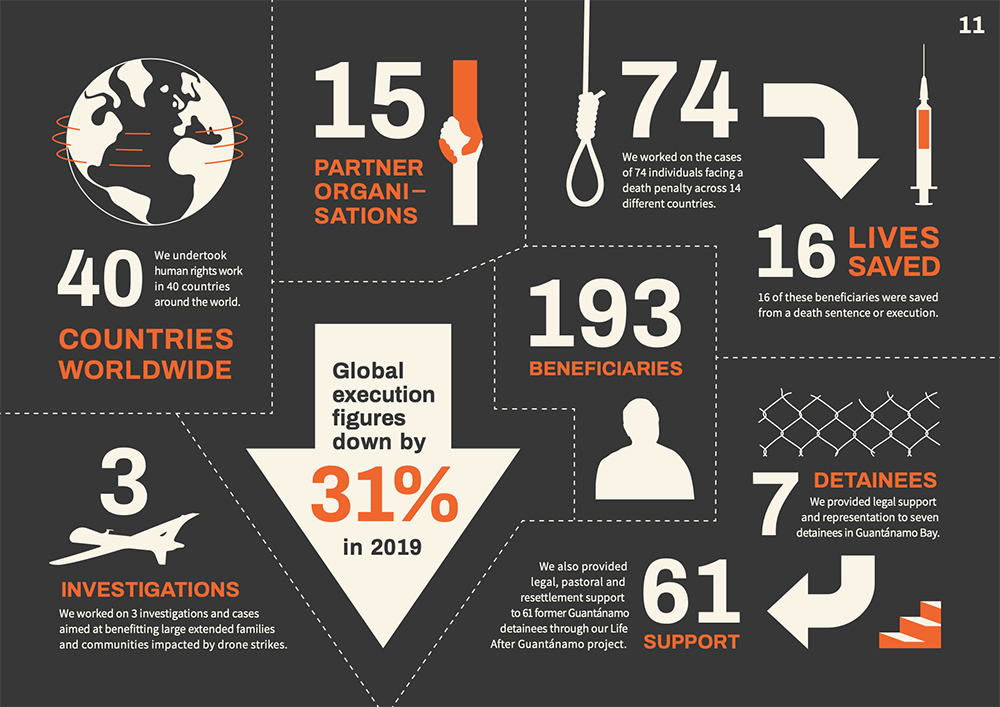2019 was a special year for Reprieve, marking twenty years of fighting for the fundamental principles of a democratic and fair society: justice and the rule of law. What we have achieved in this time is nothing short of phenomenal. Over the last two decades we have saved lives, we have changed hearts, minds and policies all across the world and we have shone a light on some of the most egregious abuses of human rights perpetrated by state actors.
Over the last decade I have watched Reprieve grow from a small team of London-based lawyers and investigators, to an organisation that is truly global – with incredible staff, fellows and partners all over the world.
When Reprieve was founded in 1999, it was focused on providing support to British nationals facing the death penalty in the USA. Now, 20 years on,
we support people of all nationalities facing the death penalty in countries all around the world. In 2002, we started working on cases of men rendered to Guantánamo Bay. As the so-called “war on terror” changed shape, so too did our work, and we now support communities terrorised by lethal drones in Pakistan and Yemen, families detained in the name of ‘counterterrorism’ in Northern Syria, and people held in secret prisons around the world.
As our work has grown, so too have our successes.

In the US, executions are at an all-time low – with just 22 in 2019, marking the fifth consecutive year with fewer than 30 executions. That same year, 65 had been scheduled, but many were unable to move ahead thanks in large part to the groundbreaking work of our lethal injection team. In Malawi, our Resentencing Project has seen the release of over 140 individuals from death row, shrinking the size of the row to historic levels. Our innovative Stop Aid for Executions (SAFE) project has had major impacts on the death penalty in some of the world’s most prolific executing states – including in Iran, where in 2019 executions were down by 50%. Our strategic projects have helped to save thousands of lives and we hope will continue to do so long into the future.
At the heart of everything we do are the individuals. Andy Tsege, Ibrahim Halawa, Ryan Matthews, Tahir Hussain, Imdad Ali, Ivan Teleguz, Ahmed Saddouma, Paco Larrañaga are just a few of those who are no longer facing death thanks in part to the work of Reprieve and our partners.
There are many, many more from all corners of the world. Reprieve will be here for as many of those facing a death sentence as we can. We know that the cogs of justice turn slowly but we also know from experience that our work can have an impact, and that it is possible to challenge and change for good systems of oppression and injustice.
Reprieve takes on hard cases and issues. Often, this means putting ourselves between powerful governments and the people they seek to abuse. And nowhere was abuse of state power more evident than in the context of the so-called “War on Terror”. Reprieve was one of the first organisations inside the detention facility at Guantánamo Bay, and I have little doubt that we will be one of the last to leave. Reprieve has represented
and secured freedom for more than 80 men detained in Guantánamo, and has provided rehabilitation support to over 100 former detainees and their family members. We continue to represent seven men still in the facility and to actively advocate for its long-overdue closure.
As small and nimble organisation, Reprieve has been able to respond swiftly as new threats have emerged on the global stage. When Obama came into office, he shifted from a policy of indefinite detention without charge or trial in Guantánamo Bay, to execution without charge or trial via drones. Reprieve took up the challenge head on in 2011, investigating drone
strikes back together with our brilliant partner organisation, the Foundation for Fundamental Rights (FFR) in Pakistan. FFR won a landmark victory in a Peshwar High Court which ruled that US drone strikes constituted a ‘war crime’, and as a result, US drone strikes have largely stopped in that country. We continue to work on emerging issues, like the indefinite detention of thousands of men, women and children camps and prisons in North East Syria.
As the year drew to a close, I stopped to consider the successes we’ve had in each of the areas of our work. From the foundations built back in 1999, we have accomplished a huge amount. There is more to be done, but
I’m proud of our impact, and excited to see how much more we can achieve together in the next twenty years.